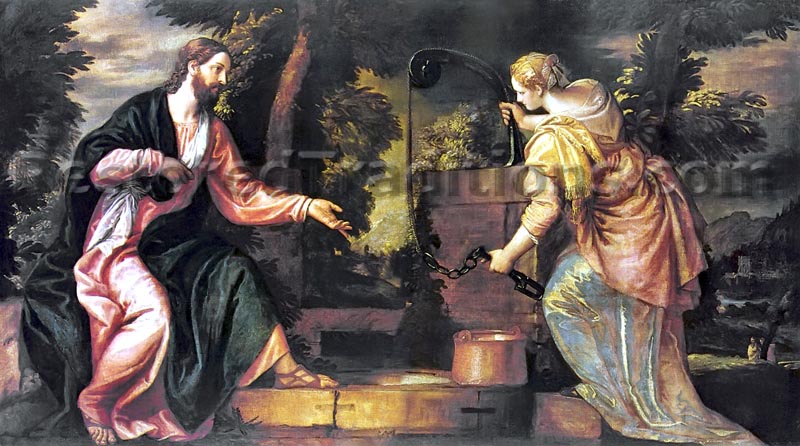On this third Sunday of Lent, we see those who are about to be baptized or confirmed undergo their final scrutinies as they prepare to enter the Catholic Church on Easter. It’s interesting to note that while these “Elect” are undergoing a special scrutiny, and while they themselves are putting their own faith under scrutiny, the account in this Gospel of John (4:5-42) presents Jesus being put under scrutiny by the Samaritan woman.
On the surface, the story appears to be a typical man meets woman story. A man, the hero — a shepherd, a teacher and an extraordinary leader — arrives at a famous well and meets a woman who has come to fetch water. The caring hand of a woman and the helping hand of a man are repeatedly found in bible accounts, particularly in those dealing with Jesus.
This particular account recalls the story of Abraham who was in search of a woman for his son Isaac. His most trusted servant whom he sent out to search for a wife for his son Isaac arrives at a well where he knew that in the evening the local girls would come to draw water. He prayed to God, saying: “God of Abraham, here I stand at this well, where the women will come to fetch water. God of Abraham, I will ask those women to give me a drink, and the one who cares…. she will be the one.” Rebecca responds to his request for a drink and Abraham’s servant immediately brings out golden earrings along with golden rings, and the marriage of Abraham’s son is thereupon arranged.
Also there is the biblical story of Jacob meeting Rachel at this very same well which was at that time covered with a tremendously heavy stone lid. When Jacob’s eyes fall upon Rachel he becomes filled with such manly strength that he is transformed into a power-filled champion who then all by himself lifts the enormous stone lid off of the well.
In the Gospel account, the well is the same well. This time, however, the man is Jesus. The woman is a non-Jew, foreigner, one who is “unclean” according to Jewish ritual laws. Jesus shocks everyone by deliberately speaking to her. Rabbis, we recall, did not converse with women in public. Not only was she a woman, she was an outcast woman. Not only was she an outcast but she had been sleeping around with at least five men. And not only did the dialogue just reported take place between them, but Jesus actually took her cup and put it to his own lips, thereby making her “uncleanness” His own. This encounter blasted all Jewish customs, laws, and religious barriers to smithereens. Also notice that it was the Samaritan woman who was scrutinizing Jesus. THAT should excite our attention.
At first she recognizes Him as a Jew. “You are a Jew,” she declares. “How can you ask me, a Samaritan and a woman, for a drink?” Jesus responds by asking her to see more than simply the appearances, recognize more than their ethnic and gender differences. “If only you recognized God’s gift…,” He tells her, suggesting that she could receive living water.
For the people in that region of the world, “living water” was flowing water, not well water. So the Samaritan woman asks Jesus where He expects to get some flowing water. “Besides,” she says, “just who do you think you are? Surely you don’t pretend to be greater than Jacob?”
In response, Jesus ups the ante by speaking about water that, if received, will end all thirst, and at the same time will give eternal life in place of the kind of life we’re now living. Additionally, Jesus discloses just what kind of a life she’s living by pointing out that she’s been sleeping around.
Well, instead of getting all huffy and offended, the Samaritan woman starts a discussion about who has true religion, who is really religious and who’s just following rules and imposing them on everyone around. “I can see you’re a prophet,” she declares, and then she begins talking about true worship, giving Jews a backhanded slap in the face as she does, just for good measure.
In response Jesus doesn’t get all huffy and offended either. Instead He starts talking about worshipping the Father in Spirit and in truth. Note that the conversation has come a long way by now from the initial request for a cup of water and the verbal sparring between a Jewish rabbi and a Samaritan woman. In fact the conversation has become so elevated that the Samaritan woman admits the she has faith in a coming Messiah. “I know there is a Messiah coming,” she says, “and that when he comes he’ll tell us everything.”
Jesus had just told her everything…. everything about who she really is and what her life is really all about, as well as announcing to her “I who speak to you am he.” The words He used were unmistakably the same is the divine name: “I Am Who Am”. Jesus was not only declaring that He is the Messiah, but that He is divine, using the very name of God “I am” with which to identify Himself. “I who speak to you am he.”
The conversion of the Samaritan woman was instantaneous. She leaves her cup and her water jar on the spot, presumably for Him to drink from, and goes off to evangelize the inhabitants of her village. One wonders if Christ drank from that cup? If He did, did He see in it the eventual Cup of Suffering from which He would drink – His passion and death?
At the beginning of this account Our Blessed Lord arrived at Jacob’s well with a thirst and the Samaritan woman gave Christ that which He was seeking. Later on, as He hung upon the Cross, we will hear Christ cry out: “I thirst!” Who, we must ask ourselves, has satisfied His thirst?
But what was, in fact, His thirst? In our hearts we all know the answer. He thirsts for our love, our response to His searching quest for His bride. He thirsts for your soul. In the Garden of Eden, God came in search of Adam and Eve. Thus from the beginning it has been God the Lover in search of His bride, our humanity. The well of water in this Gospel account, where brides had been found for Abraham’s son as well as for Jacob, presents us with Christ who had just been at Cana’s wedding feast changing water into wine, now in conversation with woman whom He loves. This same Christ would turn Cana’s wine into His very own Precious Blood at the Last Supper, sometimes referred to as The Wedding Feast of the Lamb. Immediately following that in the next day while hanging on the Cross water and blood would flow from His pierced side to slake the thirst in our hearts for God’s love.
All of this leads me to point out to you, my friends, that here before us we have those seeking union with us at Easter, those thirsting for the love of God which we will share with them in Holy Communion at Easter. They are being scrutinized, and they are scrutinizing their own faith. More importantly, they are the Samaritan woman at Jacob’s well, scrutinizing Christ, the Bridegroom that is God searching for an everlasting marriage with us, His beloved Bride.
In all of these scrutinies, do you recognize your own thirst? Do you see just who it is that is here seeking you, and what it is that He offers you? For, you see, you and I with you, as well as these catechumens and candidates, are the Samaritan woman whom Christ, in His tender mercies, loves so much.
It is we who should be scrutinizing our own faith. What will God see in us? Will we satisfy His thirst? Only you can give the answer to that question. [3rd Sunday of Lent- A]








